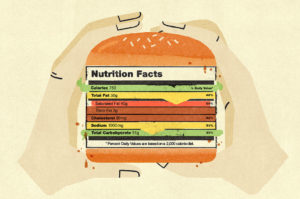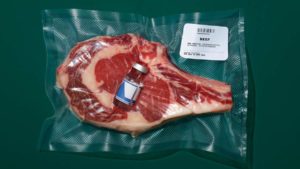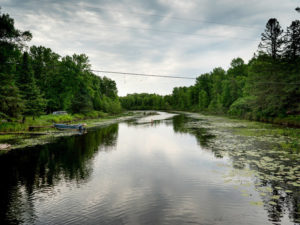How Non-Fast Food Restaurants are Contributing to Obesity
Most people are aware that Fast Food restaurants, the American “classic” food, is not good for your health. However, chain restaurants are not much better! Though it would seem that they should be, many dishes from chain restaurants are double, if not triple the amount of calories, fat, and sodium as a fast food meal. The New York Times recently reported on how deceiving chain restaurant meals can be, and how that is contributing to our current obesity epidemic.
For example, the Cheesecake Factory has a breakfast burrito that contains more calories than you should consume in a day, with 2,730 calories, 4,630 milligrams of sodium and 73 grams of saturated fat. All more than an entire days worth of calories, sodium and fat, (equivalent to eating seven sausage egg Mcmuffins from McDonalds!!)
How can we tell if a food item is healthy, with a normal serving of calories, sodium and fat? The government has finally put in place a new system requiring restaurants that have 20 or more locations, to list the calories of each item on the menu or menu board. Hopefully, this new regulation will help people choose healthier options, and pressure restaurants to adjust their recipes to be healthier.
To read the full article click here:
Consumer Reports Finds Traces of Banned Drugs in our Meats
A recent Consumer Reports article sheds light on the results of the Dept. of Agriculture’s testing of our meat supply. It turns out that there are traces of drugs that are banned for human consumption in our meat! Why has the Department of Agriculture’s Food Safety and Inspection Service (FSIS) done nothing to address this problem? Probably because it is such a huge problem they don’t know where to start. It not only has to do with the regulations, testing, and enforcement of the rules, it also has to do with the way we raise animals, including what they are fed and the conditions they live in.
Consumer Reports lists some serious drugs that have been found in the meat supply:
“Ketamine, a hallucinogenic party drug and experimental antidepressant. Phenylbutazone, an anti-inflammatory deemed too risky for human use. Chloramphenicol, a powerful antibiotic linked to potentially deadly anemia.
All these drugs are supposedly prohibited in beef, poultry, and pork consumed in the U.S. Yet government data obtained by Consumer Reports suggest that trace amounts of these and other banned or severely restricted drugs may appear in the U.S. meat supply more often than was previously known.”
The information about the banned drugs comes from a lawsuit against chicken producer, Sanderson Farms, which says that its chicken is “natural” and “free of antibiotics”, yet the tests show otherwise, and have revealed a real problem within the industry.
Food Safety scientists at Consumer Reports, and throughout the industry are concerned by the results.
“These results are credible enough that you would expect the government to take the warning signs seriously,” says James E. Rogers, Ph.D., who was a microbiologist at the FSIS for 13 years before becoming director of food safety research and testing at Consumer Reports. “You would hope the results would prompt the agency to look into why these drugs may be present, what risks they could pose, and what could be done to protect consumers.”
Since we don’t know the full effects of consuming trace amounts of these drugs, it is something that needs to be further investigated. To avoid this, consumers need to ask questions! Get to know your local farmer and find out his or her practices. Make a commitment to purchase only organic, pasture raised, grass fed meat. You will not only be protecting yourself and your family, but you will not be contributing to the inhumane treatment of animals, or the degradation of the environment that is associated with the meat industry.
The article has a lot of interesting facts, stats and quotes from other food safety scientists. To read the full article, click here:
Climate Change is showing its effects in the Midwest and on it’s wild rice harvests.
We hear about Climate Change on a daily basis, but until it effects you personally, it’s easy to put it out of your mind. Well, for some people living in the Midwest, climate change is effecting them now. NPR highlights how a once abundant, wild food, is now becoming scarce, and changing the lives of the Ojibwe Native American communities in Northern Wisconsin. Climate change has brought warmer weather, which has caused more plant diseases, an increase in rainfall, and an increase in flooding. All factors that make for a bad rice harvest, leaving some families without any rice for the entire year. To read the full article click here.
Things like this have been popping up all over the country. NPR reported recently about how with the increase in CO2 levels, plants have started to lose key nutrients, and this is an issue that we will need to start considering more seriously as time goes on.
The government is doing some research on ways to have plants survive and thrive in these new environments. At the U.S. Department of Agriculture’s Adaptive Cropping Systems Laboratory, they currently have chambers with different levels of CO2, testing plants to see how they react in these different settings. To read the full article click here.
We need to push our elected officials to make the fight against climate change ‘front and center’!!. This Thursday, September 6th, at 5:30 pm, there will be a Climate March in NYC, down in Battery Park. The #RISENY People’s Climate March will be the first of many scheduled marches taking place this weekend. There will be a national Peoples Climate March in DC , on September 8th, as well as sister marches across the country, in a call for action in the fight against climate change.
There are even some teenagers who are refusing to succumb to the fear of the future. In a new documentary “Inventing Tomorrow”, we see teenagers who are identifying problems in their communities and working to try and fix the problem. NPR reported on it saying “Laura Nix’s new documentary Inventing Tomorrow is thrilling for how it depicts teenaged scientists from around the world refusing to surrender to hopelessness. Instead they identify environmental threats around their homes and set about trying to fix them.”




Comments are closed.